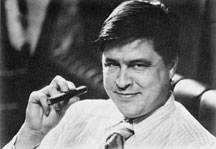
FGF E-Package
The Reactionary Utopian
November 15, 2014

Making the World Democratic
A classic by Joe Sobran
fitzgerald griffin foundation
[CLASSIC: 08/20/2002] —During turbulent times like the present, Americans make fervent appeals to "democracy," which they equate with freedom. President Bush is eager to impose democracy on Iraq and other countries whose governments he
disapproves of. Woodrow Wilson only wanted to "make the world safe for democracy": Bush wants to make the whole world democratic. Everyone seems to take for granted that democracy is the ideal form of government.
Why? What's so great about majority rule? A majority may be as tyrannical as a single dictator, and majorities have often deprived minorities and individuals of their rights -- exploited, enslaved, and murdered them. Democratic Athens executed Socrates.
Woodrow Wilson only wanted to "make the
world safe for democracy": Bush wants to make the whole world democratic. Everyone seems to take for granted that democracy is the ideal form of government.
Majority rule has its uses, as long as it doesn't threaten or violate more fundamental principles, A chess club can elect its officers, but it can't vote to change the basic rules of chess; or it ceases to be a chess club.
Most great political philosophers since Plato have dreaded democracy, fearing that demagogues would stimulate and exploit the selfish passions of the majority. The best recent critique of democracy is Hans-Hermann Hoppe's book, Democracy: The God That Failed.
The Framers of the U.S. Constitution took great pains to create a republican system in which majority rule would be tempered and inhibited by many restraints. They thought the best guarantee of freedom was to specify the powers of government and to limit it strictly to those powers.
Nevertheless, we now talk as if America, freedom, and democracy were all the same thing. It's assumed that government may justly do almost anything, provided it does so with majority support.
Actually, we don't owe our freedoms to democracy. We owe them to older legal traditions, inherited from Anglo-Saxon law: habeas corpus, due process of law, the presumption of innocence, the right to a trial by one's peers, et cetera. The Framers of the Constitution were wise enough to preserve these protections against arbitrary state power.
But the Constitution, unfortunately, has failed to provide sufficient safeguards. Its protections have been undermined — by democracy. The Bill of Rights says that nobody can be deprived of his property "without due process of law." That means an individual trial in which the defendant is proved to have forfeited his property by his own acts.
We now talk as if America, freedom,
and democracy were all the same thing. It's assumed that government may justly do almost anything, provided it does so with majority support.
But democracy deprives all of us of our property through taxation and inflated currency. The average citizen would have to commit a serious crime in order to be fined the amount he is forced to pay the government in annual taxes. He is, in effect, severely punished without a trial — for living in a democracy.
Yet he is told that he is blessed to live in a democracy. Why? Because he can vote! And if he is outvoted by people who want the government to take his money and give it to them? Well, too bad. Those are the breaks. And after all, he can use his vote to defend himself against other voters. That, he is taught, is freedom.
Of course this is a bad joke. The individual vote matters in a jury trial, because it can decide the verdict, especially when a unanimous verdict is required. But when millions vote and a bare majority is decisive, the value of the individual vote is near zero. One economist has calculated that you are more likely to be run over on your way to the polls than to make any difference with your vote.
No wonder democracy has been defined as "two wolves and a lamb voting on what to have for lunch." So much for the idea that voting is a fundamental freedom, or that it protects freedom. The more democratic the U.S. Government has become, the larger and more rapacious it has become. The lambs keep losing the elections.
The principle of democracy is bad enough in itself. But in practice democracy also breeds corrupt politicians, intent on short-term gain for themselves. The brevity of their tenure gives them an incentive to make hay while the sun shines. Bribery, often in technically legal forms, is rife, and a suspicious number of our "public servants" retire with fortunes that seem a bit out of line with their salaries.
No, the world doesn't need more democracies. It needs more freedom — a vastly different thing.
The Reactionary Utopian archives
Copyright © 2014 by the Fitzgerald Griffin Foundation. All rights reserved. This article was originally was published by Griffin Internet Syndicate.
Joe Sobran was an author and a syndicated columnist. See bio and archives of some of his columns.
Watch Sobran's last TV appearance on YouTube.
Learn how to get a tape of his last speech during the FGF Tribute to Joe Sobran in December 2009.
To subscribe to or renew the FGF E-Package, or support the writings of Joe Sobran, please send a tax-deductible donation to the:
Fitzgerald Griffin Foundation
344 Maple Avenue West, #281
Vienna, VA 22180
1-877-726-0058
publishing@fgfbooks.com
You may also subscribe or donate online.
@ 2025 Fitzgerald Griffin Foundation